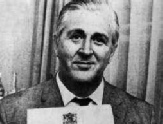© 2014-


Britain Radio - History (2)
The Bill to outlaw offshore broadcasting stations -
The initial reactions from the offshore stations to the Bill were defiant, containing general expressions of determination to fight its introduction and continue broadcasting. Bill Vick of Radio England/Britain Radio said "our ship is American owned and crewed, and the DJs are American. I have already been approached by several continental businessmen about advertising."
By coincidence on the day of the Bill's publication Radio England/Britain Radio held a champagne party a t the Hilton Hotel in London, attended by over 600 guests, including many contemporary pop stars. It was a public relations exercise designed to demonstrate support from the world of show business for offshore radio stations in general, but the hotel’s bill was never paid.
t the Hilton Hotel in London, attended by over 600 guests, including many contemporary pop stars. It was a public relations exercise designed to demonstrate support from the world of show business for offshore radio stations in general, but the hotel’s bill was never paid.
Despite the fact that Britain Radio had been less successful in audience terms than its sister station its own transmissions were not affected by the closure of Radio England in November 1966. The easy listening station continued to broadcast much as before, although advertising revenue and audience levels were still declining.
Pier Vick had set out with Britain Radio to challenge 'sweet music' station Radio 390, but their American style format had not worked. A number of informal approaches were made by the American team to Ted Allbeury, Managing Director of Radio 390, suggesting either a merger of the two stations or a joint management operation. However, the other Directors of Estuary Radio Ltd. (Radio 390's owners) refused to consider these options and early in 1967 Ted Allbeury found himself unable to continue as Managing Director of Radio 390.
Shortly after leaving Radio 390 Ted Allbeury was again approached by the management of the now ailing Pier Vick company inviting him to join Britain Radio as Managing Director. Ted Allbeury agreed to look at the American station's financial records and Pier Vick asked for his advice on their continued operation. Ted Allbeury's recommendation to the Americans was not to spend any further money on the project because, on anticipated performance, Britain Radio would be unable to turn in a profit before the Marine etc. Broadcasting (Offences) Bill became law later in 1967. Undeterred by this recommendation the Pier Vick management then asked Ted Allbeury how much it would cost to keep Britain Radio on the air and agreed to put up whatever was required financially if he would agree to run the station. 
So, at the beginning of February 1967, Ted Allbeury joined Britain Radio announcing in a press interview that " Britain Radio is a very professionally run outfit, they are determined to go on despite the difficulties they have been having." However, almost as soon as he had been appointed Jack Curtis, the American General Manager of Britain Radio, resigned 'for professional and personal reasons', but it was obvious that the two men had widely differing views about the future format for the easy listening station.
Ted Allbeury had plans to introduce the Radio 390 concept of 15 and 30 minute programming segments to Britain Radio -
During the third week of February 1967 the Laissez Faire's aerial mast was damaged after the vessel became caught in early spring tides and a Force 9 gale. Eventually the weather calmed sufficiently for the crew to secure the remaining wreckage of the aerial and prevent further damage to the radio ship. With Britain Radio and Radio Dolfijn off the air most DJs were taken off the ship, leaving just two English DJs (Dave McKay and Alan Black) and two transmitter engineers on board.
On 7th March 1967 the Captain was instructed to take the vessel to Zaandam, near Amsterdam for repair. On arrival in Holland the Dutch Customs authorities came aboard the Laissez Faire and sealed the transmitter room and studios. However, the radio crew managed to temporarily remove the seals and use the studio equipment while the ship was in harbour.
One of the station's original American backers, Tom Dannaher, visited the Laissez Faire in Zaandam and authorised the shipyard to carry out repairs to the mast. This authorisation to incur expenditure was given at a time when the station's management company, Pier Vick Ltd, was in severe financial difficulties and it went into voluntary receivership on 14th March 1967.
Managing Director of Britain Radio, Ted Allbeury, who together with John Withers (brother of ex-
After repairs had been completed to the Laissez Faire, now under the supervision of Ted Allbeury, the ship sailed back to the British coast in March 1967. Carstead Advertising planned to re-

Ted Allbeury

Click on picture to enlarge

History
Key Dates
Ship and Location
Technical
Staff
Programmes





Click image to enlarge
Left: a staff pin badge for the party at the Hilton Hotel.
Courtesy Ron O’Quinn
Treasure Chest





Back to Britain Gallery


Back to Britain Radio
